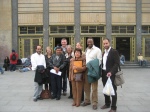International Academic Seminar
Decolonialization and Educational Challenges: Reflections from Bolivia and Brazil
24th of October, Universidad Mayor San Andrés, La Paz, Bolivia
In October 2008 the IS-Academy program Education and Development of AMIDSt/University of Amsterdam (UvA) together with the faculty of education of the Universidad Mayor San Andrés (UMSA) in La Paz, Bolivia, organized an international seminar entitled Decolonialization and Educational Challenges: Reflections from Bolivia and Brazil. The objective of the meeting was the exchange of reflections and experiences in relation to the work with theories of coloniality/ decolonialization in education, focusing thereby specifically on the area of teacher training.
The seminar was opened by the Director of the Faculty of Educational Sciences of the UMSA Lic. Orlanco Huanca. Invited speakers where: Dr. Felix Patzi (Universidad Mayor San Andrés, General Secretary of the prefecture of La Paz); Dr. José Luis Saavedra (Universidad Andina, La Paz); Dr. Renato Emerson dos Santos (Centro de formación de profesores, Universidad Estadual de Rio de Janeiro, Brazil). And invited participants for the seminar where: Sr. Walter Gutiérrez (Consejo Educativo de los Pueblos Originarios Aymaras); Sra. Virginia Ruiz Vila (representative of the Ministerio de Educación – PNTICs); Dr. Mario Novelli (IS-Academy/ University of Amsterdam); and Dr. Antoni Verger (IS-Academy/ University of Amsterdam). Also present were several other actors from within and around the education field and the students of the second year of the career of Educational Sciences of the UMSA. Maria Luisa Talavera, professor from the Faculty of Educational Sciences, performed the role of moderator during the seminar.
The four themes that framed the presentations and discussion where:
1) What are the central challenges and themes in both countries in relation to educational inequalities?
2) What tools do the theories of coloniality/ decolonialization offer us?
3) What are the difficulties and limits of these theories?
4) What is the value of these theories in educational practices?
The main outcomes of the conferences (see the link below for the full report in Spanish):
Dr. Patzi stated that since 2006 the Bolivian government has used the concept of ‘descolonialización’ in its policies. Patzi affirmed that, when reflecting on descolonialization and education two points have to be considered: 1) The organization of education. In Bolivia opportunities are still distributed along the lines of race, ethnic, culture and language. Patzi states that these are social constructions based on Eurocentric perspectives. These differentiations need to be left a side. In practical terms then decolonialization would mean: combine the urban and rural teacher training institutes in order to train one type of teacher. 2) Educational contents or curricula. Changing the contents of curricula refers to a change of mental constructions. One of the actual problems in Bolivian education is that until now the Eurocentric contents have been given a privileged place and the knowledge, practices and social concepts of the indigenous societies have been completely neglected.
Dr. Saavedra also affirmed that educational inequalities are central in educational debates at present in Bolivia. He referred to the impact of neo-liberal reforms in education and especially to the lack of quality in education. Saavedra pointed to the need of a systematization of indigenous knowledges and thereby expressed a critique in relation to theories of coloniality: they do not formulate practical proposals. He argued that real decolonialization can only come from indigenous people themselves. Saavedra pointed to the value of decolonial theories in educational practices, referencing to three levels in educational contexts: 1) Institutional level. Schools as they exist nowadays are products of the European industrial revolution. The modern school should be open; the whole society should be an educational and pedagogical space. 2) Curricular level. The curriculum is one of the most potential western colonial constructions, presenting reality in so called disciplines. This neglects completely the epistemology of complexity created by indigenous people. 3) Level of attitudes. Saavedra pointed to the importance of the human attitudes (coherence, affect, love, values) in education and stated that the main tool in education should be dialogue.
Dr. Renato Emerson dos Santos focused in his conference on racial inequalities in Brazilian education. He explained how decolonial theories are used and could be used in the fight against these inequalities, mainly fought by activists of the black movements and intellectuals. Thereby he gave an overview of the historical and actual struggles, outcomes and main debates within these movements. He explained that there is only a small group of intellectuals and activists (mainly from Brazilian black movements) that are starting to deal with theories and debates about coloniality. Especially intellectuals and activists that work with the theme of racial inequalities consider the theories of coloniality a fundamental tool that make it possible to propose a real form of emancipation for racial equality. The ‘myth of Brazil as a racial democracy’ is very strong. According to Santos, this myth, together with ideologies and a history of a ‘whitening of the population’, lead to the loss of the subjectivity of many Brazilians. Racial inequalities are thus often naturalized and not recognized as something that needs to be tackled with specific public policies. Santos states that the theories of coloniality are useful in the sense that they explain how we live in a colonial, capitalist world system that is constructed based on a pack of social hierarchies serving different forms of social exploitation.
For further information about the seminar, please contact Mieke Lopes Cardozo (mlopescardozo@fmg.uva.nl) or Inti Soeterik (i.m.soeterik@uva.nl), organizers of the seminar and members of the Education and Development group, both developing PhD projects in respective Bolivia and Brazil.For those interested in further details: the memorandum of the seminar (written in Spanish) can be downloaded HERE

